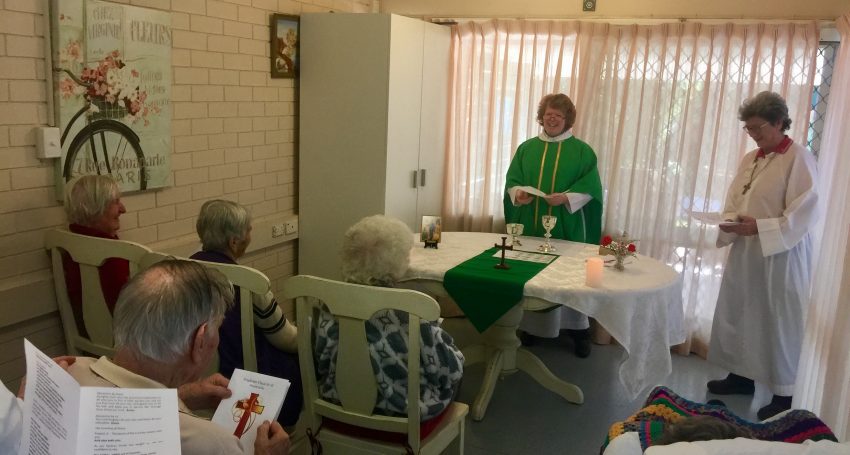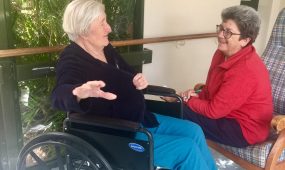Personal reflections on the meeting of faith and dementia
Features
Spiritual and Pastoral Care Coordinator at Anglicare, Roz Rogers, and Director of Mission for Anglicare, The Rev’d Canon Linda McWilliam, share their personal reflections on dementia and faith

Roz Rogers reflects on how all things are possible with love
For seven years, I have ministered as Spiritual and Pastoral Care Co-ordinator at Anglicare’s Taigum aged care facility – and what an amazing journey of discovery this has been. Unfortunately, it comes with the territory that many of these beautiful people live with dementia and some of our Symes Grove people are prone to wandering and getting lost, so they need to live in our Memory Support Unit. It is they, with advanced dementia, who have taught me the most about how our spiritual lives continue to grow and flourish, no matter how advanced our cognitive and/or physical decline.
Advertisement
I have been privileged to see God’s presence in real action here. God set in place the laws of nature and one of those laws is that nature abhors a vacuum. We are made up of three parts: body, mind and spirit; and I now firmly believe that if mind and body decrease, the spirit must increase. For example, the bed-ridden residents who no longer speak and do not seem to know what is said to them. I see their eyes come alive, perhaps also with the hint of a smile, as I give them Communion or a blessing.
There is also the regular group who attends our special Communion service. Together, we have worked out how to share the joys and sorrows of life through worship; and I see new residents begin to blossom spiritually. We actively engage with each other through the ritual, the music, our short spiritual discussions, the humour and the tears, the prayers, the Sacrament, and the companionship. We keep it simple, we keep it slow, we keep it real. We focus on Love.
Advertisement
Love is the key to everything. Love helps me slow down my talk, so that they have time to understand. Love asks me to be observant, so I can pick up on the sometimes very subtle signs that they have understood me. Love helps us to experiment until I find the right approach. Anglicare is a rare organisation, in that one of our four principles of care is Love. With love, all things are possible.
The Rev’d Canon Linda McWilliam reflects on her mother’s experience
For many people, especially in the early stages of dementia, the ability to practise faith or religion assists in finding a deeper connection to the Divine. This was particularly true for my mother in her later years when she was diagnosed with Alzheimer’s. Her faith had always been incredibly important to her and remained so until she died.
As her condition progressed the parish priest, dressed in his alb and stole would hold up the Sacrament and Mum would open her mouth ready to receive it. The symbols of the priest’s robes and the Sacrament helped Mum to remember and connect with the ritual of Communion. She would follow up with a beautiful smile and say to the priest “you are gorgeous”. That was her way of being able to express how important the Sacrament was for her. The symbols of the priest’s robes and the Sacrament connected Mum with the mysterious presence of the Divine, providing her with peace and hope.
Related Story
 Features
Features
When faith and dementia meet
These times were perfectly wonderful moments – moments full of grace that put a smile on her face and a twinkle in her eyes. Five minutes later, she would not remember what was said or done, but the feeling that she was left with lingered.
Chaplains can provide hope as they break through the barrier of memory, in part, by a thoughtful and deliberate use of techniques related to implicit memory. This involves using another form of memory that is primarily unconscious, diffused, symbolic, affective and not language based. Implicit and procedural memory and the music centre of the brain are resistant to the effects of dementia.
Spirituality is inherent to the human being and spiritual care brings comfort and empowers individuals to continue to live with hope.





